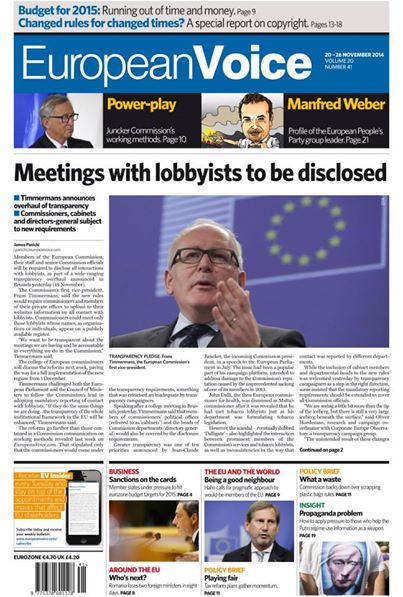 Within a month in office, the incoming Juncker Commission announces its first tangible steps to increase disclosure relating to its lobbying contacts.
Within a month in office, the incoming Juncker Commission announces its first tangible steps to increase disclosure relating to its lobbying contacts.
In an interesting move, Commissioner Timmermans (Better Regulation) two weeks ago circulated an internal note, which was soon leaked to the press, explaining the pending change. The note argued that “while contact with stakeholders is a natural and important part of the work of a member of the Commission, all such contacts should be conducted with transparency and members of the Commission should seek to ensure an appropriate balance and representativeness in the stakeholders they meet.”
As a consequence of this line, the 28 members of the Commission will be required to disclose on their websites all contacts with lobbyists as of 1 December. The EUObserver quoted Timmermans saying: “I think we have moved to a situation now where the public says to government ‘show me!’ And we want to show you”.
Civil society has so far reacted with cautious enthusiasm. While a number of NGOs consider the new policy a step in the right direction, they argue that disclosure of the involvement of outside actors in EU decision-making should be more more generous, including a retracable ‘legislative footprint’ of all lobbyists’ input at all stages of the process, and standardised disclosure rules that apply across the EU institutions. Timmermans, meanwhile has polished up the old inter-institutional ‘transparency competition’, inviting the other institutions to adopt similar measures.
Following the resignation of Commissioner Dalli of Malta in 2012 under suspicious circumstances related to a pending tobacco directive, which have not yet been laid bare up until today, the powerful role of lobbyists in the EU’s policy process has received renewed public attention. On a par with lobbying Washington practices, those in Brussels however remain far less regulated. Until recently, Commissioners only disclosed their contacts with private interest representatives on a voluntary basis. The same still holds for MEPs, a number of which now only meet with lobbyists included in the voluntary lobbying register, and member state ambassadors to the Council, who still operate fully out of public sight.
UPDATE 25/11/2014: The Commission’s press statement concerning the new transparency initiative can be found here. -MH
